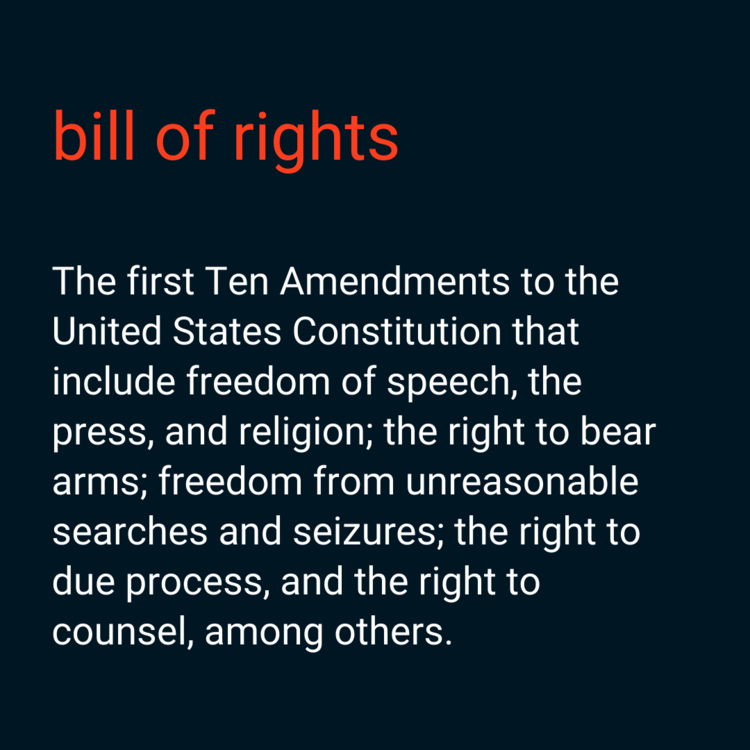In America, we have to work to achieve our goals. This is the basic rule taught to us in our country – and in a good many places besides. Sometimes, just sometimes, however, because of the sacrifices of those who came before us, merely by being alive, we are entitled to certain rights. A right is essentially a legal confirmation that, by virtue of being in a certain place, at a certain time, a person is entitled to certain freedoms. Rights are the foundation of our nations, societies, and cultures, allowing individual people to live in communal societies. The liberties that we enjoy in the United States are the product of our history, namely the Constitution and the Bill of Rights.
The Constitution is one of America’s proudest achievements. It sets out the rules and structures that serve as a legal basis both for the existence of the United States and the distribution of power within it. But during its formation, our constitutional project faced significant opposition. Some leading Americans, known as Anti-Federalists, fiercely opposed it. They argued, in part, that the Constitution failed to protect citizens’ rights and liberties from the federal government, and demanded that it include a Bill of Rights. They believed that these amendments would explicitly guarantee Americans’ rights.
With this determined opposition, it was clear that the Constitution would not be ratified by the states unless a Bill of Rights was added. In fact, a third of the states conditioned their approval on its inclusion. So James Madison, the architect of the Constitution, introduced a set of 12 amendments that listed the fundamental rights of every American citizen. 10 of them were ratified in 1791 and the Bill of Rights was born.
What freedoms does the Bill of Rights guarantee? Let’s start with the First Amendment:
“Congress shall make no law respecting an establishment of religion, or prohibiting the free exercise thereof; or abridging the freedom of speech, or of the press; or the right of the people peaceably to assemble, and to petition the Government for a redress of grievances.”
Can you imagine a world without these rights? If there were no freedom of speech, we would live in constant fear of speaking our minds about politics; saying the wrong thing could land you in jail. If there were no freedom of peaceful assembly, forget about standing up for what is right or affecting change through a protest movement. The First Amendment made possible countless movements in American history – from the Suffragettes to Civil Rights to our current political moment. And without the free exercise clause, the religious pluralism at the core of American society would be a dream, rather than a reality that has attracted millions to our shores and ensured your right to practice whatever religion you choose.
But these rights under the First Amendment are just the beginning.
Under the Second Amendment and current constitutional precedent, you have an individual right to own a firearm.
The Fourth Amendment protects you from unreasonable searches and seizures by the government. What does this mean? Well, the government can’t simply barge into your home. To do so, law enforcement needs a warrant based on probable cause issued by a judge that limits who and what they can search or seize. In short, you have a right to privacy in this country that is protected by the Bill of Rights.
The Fifth Amendment protects you from having to testify against yourself in a court of law and guarantees you due process before being deprived of life, liberty, or property. Have you ever wondered why you have the right to remain silent upon being arrested? Or why you can’t be tried for the same offense twice? You can thank James Madison and the Fifth Amendment for that.
The Sixth Amendment is the reason you’re entitled to a speedy and public trial, why you have the right to confront witnesses against you, and have the assistance of a lawyer to defend yourself in a criminal case. Can you picture an America without these basic liberties?
And that’s only half of the Bill of Rights.
Indeed, without the first ten Amendments to the Constitution our country would be unrecognizable. But the power of the Bill of Rights extends far beyond the freedoms they protect. It shows that our Constitution can change and our democratic system contains the roots for its own improvement over time.
The Bill of Rights was the start of a centuries-long refinement of the founders’ vision. To date, we have added 17 other amendments to the Constitution, each of which has changed our country in ways that were unimaginable in 1791. The 13th Amendment outlawed slavery in America, while the 14th Amendment granted citizenship to all those born on American soil and required the states to guarantee equal protection under the law. The 15th Amendment theoretically ensured that all Americans could not be denied the right to vote because of their race, color, or prior condition of servitude. And the 19th Amendment finally gave women the right to vote.
In short, the Bill of Rights is old but timeless. Many of the greatest advancements in our democracy have been justified by invoking the Constitution and the Bill of Rights. That’s the real value of those texts: they are strong enough to give protection, but dynamic enough to expand. So as we navigate our own constitutional challenges, we must look to the Bill of Rights, because our future remains rooted in our past.




